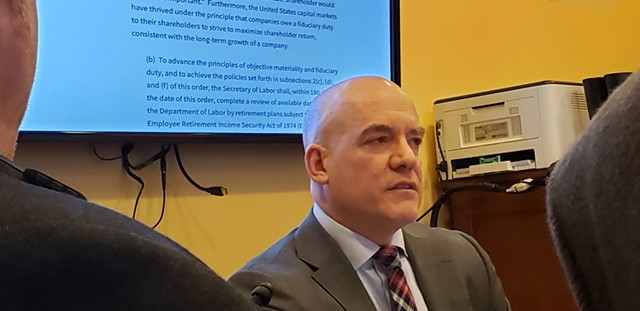
- Kevin McCallum
- Luke Martland, director of the Office of Legislative Council, testifies before the House Energy and Technology Committee Tuesday.
President Donald Trump’s two recent executive orders aimed at speeding up the construction of oil and gas pipelines have raised concerns among Vermont legislators who are considering a ban on such projects.
The orders, signed April 10, will make it easier for companies to build oil and gas pipeline projects, and harder for states to use the federal Clean Water Act to block them.
Meanwhile, local environmental groups want to see Vermont take bolder action to address climate change, including by restricting the expansion of fossil fuel infrastructure in the state.
The House Energy and Technology Committee is considering three bills that would do just that.
H.51 would outright ban new fossil fuel infrastructure;
H.175 would limit the use of eminent domain for pipeline projects; and
H.214 would require the Public Utility Commission to consider potential fuel leaks in groundwater when approving new natural gas facilities.
A public hearing on the three bills is scheduled for April 23.
During a House Energy and Technology Committee meeting Tuesday, members asked Luke Martland, director of the Office of Legislative Council, to brief them on how the executive orders might impact the proposed bills.
Rep. Tim Briglin (D-Thetford Center) said he’s read news accounts suggesting the Trump administration is unhappy that New York state is using its federal environmental laws to slow or reject pipeline applications.
“My sense is that there is some frustration with the executive branch in Washington with the use of the Clean Water Act to stall or to prevent some of these pipelines going forward,” Briglin said.
But Martland said it struck him as premature to worry about the implications of the executive orders on the state.
He said the orders only instructed the U.S. Environmental Protection Agency to begin the process of revising its internal rules before it considers updates to formal regulations. Public input, the lengthy rule-making process and potential litigation are all likely to foil the administration’s goal of getting changes in place in 120 days, Martland said.
“This is the beginning of a regulatory process that may take a number of years and is not going to make any changes in the short term,” Martland said.
After the committee meeting, Sen. Chris Bray (D-Addison) told
Seven Days that he planned to take part in an EPA webinar on Wednesday that's aimed at educating legislators around the county about the impact of the orders.
“The Trump administration has done a lot of things that have made it harder to reach the state’s goal of 90 by 2050,” Bray said, referencing the 2011 initiative to get to 90 percent renewable energy by 2050.
But Bray said he doubts the orders will have much immediate impact on the future of the state fossil fuel infrastructure network.
Local opposition to such infrastructure, like Vermont Gas ran into in its effort to expand gas service to Bristol, is more likely to affect future decisions by the state’s sole natural gas utility than anything at the federal level, Bray said.
The public hearing takes place April 23 from 5 to 7 p.m. in Room 11 of the Statehouse.











Comments (2)
Showing 1-2 of 2
Comments are closed.
From 2014-2020, Seven Days allowed readers to comment on all stories posted on our website. While we've appreciated the suggestions and insights, right now Seven Days is prioritizing our core mission — producing high-quality, responsible local journalism — over moderating online debates between readers.
To criticize, correct or praise our reporting, please send us a letter to the editor or send us a tip. We’ll check it out and report the results.
Online comments may return when we have better tech tools for managing them. Thanks for reading.